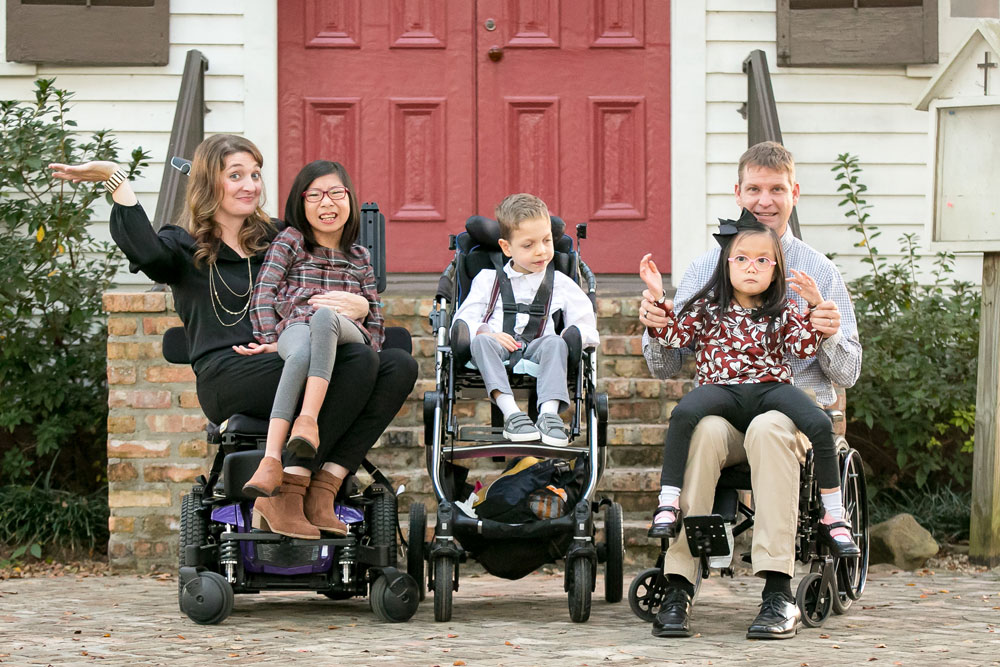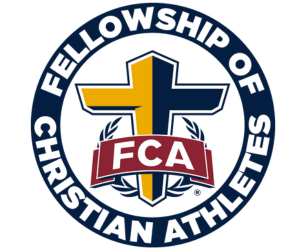By KATIE EUBANKS
Doug & Elaine Williams
Their big YES to special needs parenting
When I pull up to the Williams house in Raymond for our photoshoot, 8-year-old Lily is accompanying her daddy to the carport to take out the trash. She claps, fidgets with her hands and looks around a lot, but doesn’t look directly at me much.
When we enter the kitchen, 16-year-old Esther wheels in to see what’s going on. Smiles at me. She has a speech impediment, but she sings in the school choir and was recently named 7th Grade Princess for homecoming.
Benaiah is 8 years old and sits in a wheelchair or his parents’ laps. He is gentle and smiles easily, and (like many other boys) enjoys noises that imitate bodily functions.
These kids are a delight and a challenge. And they are a huge part of Doug and Elaine Williams’ crazy God-story.
A ‘NORMAL’ CHRISTIAN LIFE
Before they knew each other, both Doug and Elaine fully surrendered their lives to God when their first marriages crumbled.
After her divorce, Elaine moved to New York and returned to her love of ministry. Doug worked at Hinds Community College, where he is the men’s head soccer coach. While Elaine was in New York, their mothers were in the same Sunday school class.
A back injury sent Elaine back to Mississippi, unable to leave the house, and Doug’s mother started coming over to have Bible study with her.
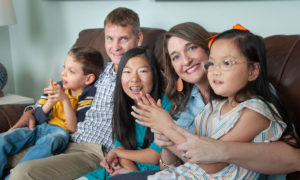
From left, Benaiah, Doug, Esther, Elaine and Lily Williams.
Finally, after Doug felt the Lord had released him to date again, he called his mom to see if she knew any single Christian women. She told him about Elaine.
“We didn’t fall in love right away, because we were both so scared,” Elaine says. “We spent three months just going to dinner, crying, laying everything out on the table. We didn’t do anything fun.”
“We had fun,” Doug says. “Just normally, when you go on a date, you show your good side.”
But instead, they each told the other all about their past, their present, and their future — which would be with God, no compromises this time.
They got married after a year and a half, in 2008, and then waited another year before starting their family.
“After that year was up, boy I was ready,” Elaine says.
Soon she was pregnant. But at their first ultrasound, there was no heartbeat.
“We were both teachers at the time, and we just laid on the couch all summer and cried,” Elaine says.
Around that time, Doug read a book called “The Normal Christian Life” by Watchman Nee, a Chinese church leader and teacher who spent the last 20 years of his life imprisoned for his faith.
“(After reading that book) I said, ‘We’re going to go through something,’” Doug says.
“‘There’s going to be a lot of pain, a lot of tears, and we’re going to live honorable lives.’”
BENAIAH
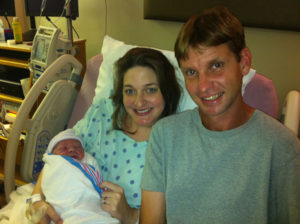
Elaine and Doug with newborn Benaiah.
When Elaine got pregnant again, everything seemed normal — even for the first couple months of Benaiah’s life.
“When he was three months old, we started to wonder if he was on target, but we had nothing to compare him to. When he was four months old, my sister and her family came home for Christmas. She’d had her little girl two days before Benaiah, and …”
“It was very clear,” Doug says.
In early 2012, Doug and Elaine took their baby to a neurologist, who immediately admitted Benaiah to the hospital and started running tests.
CAROLINE
Meanwhile, they’d just found out Elaine was pregnant again.
This time, the first ultrasound revealed a heartbeat, but also a brain that was not developing normally.
“We had to go to the doctor so often, and it was so emotionally draining,” Elaine says. She and Doug shifted their energy from finding answers for Benaiah to trying to save their baby girl.
“We just prayed a million times, ‘Heal our baby,’” Doug says. “That was all we could get out.
“We were being pressured to do all kinds of tests, and it was like, ‘There’s a 1 percent chance she’ll die (if we do this test).’”
Abortion also was mentioned as an option, Elaine says. She and Doug basically rolled their eyes at that idea. Nope.
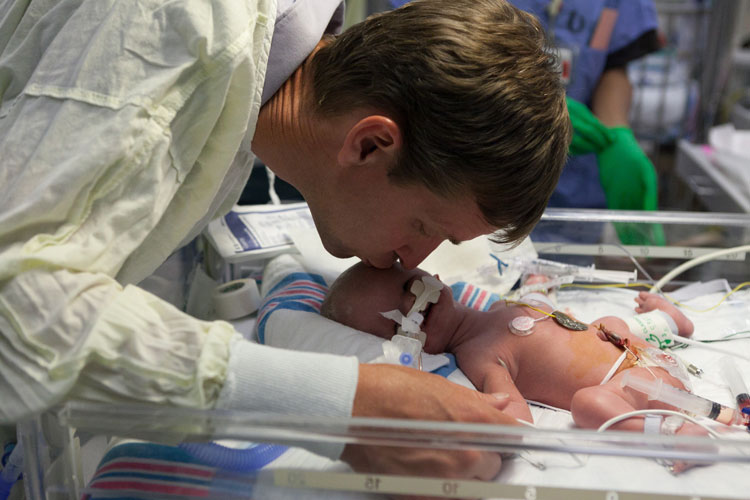
Doug kisses baby Caroline’s head. “I think God made her premature so we could hang out with her,” he says.
Finally, “one day I just took a walk,” Doug says. “And God told me, ‘You’re not her doctor. You’re her daddy. Do not take risks.’”
So no more tests were performed on Caroline. Meanwhile, there was still no solution for Benaiah.
“I remember holding Benaiah, being pregnant with Caroline, (and) I was crying at
the realization that (we couldn’t fix him),” Elaine says.
Even though Caroline was not expected to make it to term, “we desperately wanted her to live to birth so we could meet her,” Elaine says.
For the six months following the ultrasound, “God totally prepared our hearts,” Doug says.
Caroline was born premature and lived for 20 days.
“She passed away before her due date. I think God made her premature so we could hang out with her,” Doug says.
He and Elaine took turns grieving deeply for several months at a time. Elaine became angry with God, and at one point she thought that the darkness inside of her would take her life — not via suicide, but that it would just kill her.
“Doug fought for me in the spiritual realm,” she says.
Then after the weight finally lifted off of Elaine, it was Doug’s turn.
LILY
Just over a year after Caroline’s passing, in fall 2013, Doug and Elaine decided to adopt. They’d always thought they’d adopt eventually, and now they had a heart for special needs children.
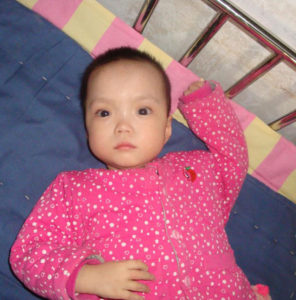
The first photo the Williamses ever saw of Lily, when she was still named Tilly.
“(But) I said, let’s get a child with minor special needs,” Elaine says. “And Doug was like, no way.”
“(I said), ‘We’re going to get in the line no one else is in,’” he recalls.
On an international adoption site, Elaine started looking at children from China, which has a very “clear-cut” adoption process, she says.
“I saw this little girl’s picture … she sounded so much like what we thought Caroline would be. She was 2 years old and unable to sit up (or) eat. I called to Doug to come look at her picture. But I said, ‘If you’re not ready …’”
Doug’s reaction? “Now that I’ve seen it, I can’t un-see it. That could be our daughter, and she’s needing a family.”
Within three or four days, he and Elaine made up their minds. They started the adoption process.
A couple months later, the orphanage said the little girl would probably die before the adoption was finalized. “She was just about 3 years old, and she was 18 pounds. She couldn’t sit up or eat solid food,” Elaine says.
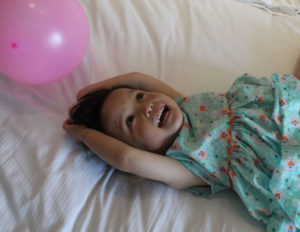
Hours after meeting her new parents, Lily Williams finally smiled at a pink balloon.
The adoption agency transferred the girl, then named Tilly, to a medical facility. After that, “we got no more updates. The agency just told us to keep going with our home study,” Elaine says.
Tilly’s health improved, and the whole adoption only took nine months. The Williamses flew to China and renamed their daughter Lily.
“She came to us in a stroller (because she couldn’t walk),” Elaine says.
“We took her to a hotel room, and Doug laid her gently on the bed like she was going to break.”
He left the room for a short time, and Lily lay there on her back on the bed — Elaine staring and staring at her new daughter. Then Lily rolled over onto her tummy, pulled her legs under her and sat on her feet. All by herself.
Elaine yelled, “Doug!”
They’d had no idea she was that mobile.
ESTHER
Before going to China to get Lily, Elaine connected on Facebook with other mothers who were adopting from the same orphanage. One of them posted a photo of a little girl sitting in a crib. Her name was Dang Jing.
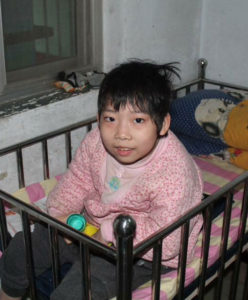
This was the first picture Elaine ever saw of Esther, then named Dang Jing. She was about 10 years old.
Elaine kept seeing Dang Jing in the background of other people’s photos, but never as the child being adopted. When the Williamses went to the orphanage for Lily, Elaine prayed to meet Dang Jing.
“When I saw her, I burst into tears. I took her picture, told her how beautiful she was, how much God loves her. Of course, she didn’t understand me. I sent a picture to the adoption agency and said, ‘Please find this girl a family.’
“We started praying for her. We found out she was 11 and had cerebral palsy. We found out the orphanage didn’t think anyone would adopt her, and they hadn’t even made her a file. It was never going to be an option for her.”
At that point, Lily still wasn’t walking. Both she and Benaiah were in wheelchairs. Dang Jing also couldn’t walk.
“I was like, ‘I can’t do three wheelchairs,’” Elaine says. “(Then) the Lord promptly taught Lily to walk (and) started knocking on my heart: ‘Now are you ready?’”
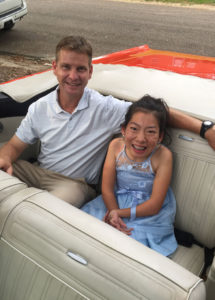
Doug Williams with his 7th Grade Princess, Esther, September 2019.
For months, she and Doug went back and forth about whether to adopt Dang Jing. And “we knew she was going to age out,” Elaine says. “You can’t adopt internationally from China after they turn 14. But then they still live in an orphanage (until adulthood),” Doug says. Even as an adult, Dang Jing would have lived in something comparable to Whitfield, Mississippi’s state mental hospital.
Finally, Elaine recalls, “God laid this question on Doug’s heart that we had to ask ourselves: At the end of our lives —”
She pauses, turns to Doug — “help me.”
She starts crying as Doug picks up: “Would we like to say the Lord put this girl on our hearts and we left her in China, or that we took on unknowable difficulties and went and got her?”
They chose the latter.
“When we told people, nobody said, ‘That’s great,’” Doug says. “They were all like, ‘Are you out of your mind? You already have two special needs kids.’”
They named their new daughter Esther.
BRUSHING TEETH AND CHANGING DIAPERS
So far, God has provided all the help the Williamses need. And because they’re committed to Him, “we have this big three-letter word, YES, on our hearts,” Elaine says.
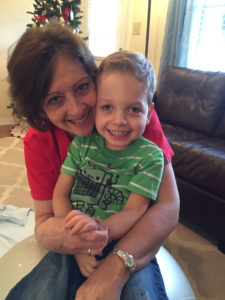
Benaiah with his physical therapist Janet Slaughter, who played a crucial role in the Williamses’ lives as they settled into their role as special needs parents.
“Parenting special needs kids is how He has directed that yes.”
All three children have rare genetic disorders (they finally discovered Benaiah’s when he was 6 years old). Benaiah is the most medically dependent — he’ll most likely stay at the developmental stage of a 4- to 5-month-old for the rest of his life — and he and Lily are nonverbal. Esther is the most highly functioning.
Eating out as a family is tough.
“There’s no changing table for an 8-year-old,” Elaine notes. So she’ll bring a yoga mat and put it down on the restroom floor, or take Benaiah to the back of the van — or better yet, an outdoor spot that’s shaded and protected from view.
The girls don’t wear diapers, but they still need help in the bathroom. And none of the children can dress, groom or feed themselves, or brush their own teeth. Doug and Elaine do it all. Benaiah’s food has to be puréed, and because he’s too weak to eat enough on his own, he also has a feeding tube.
The kids attend public school, where Lily and Benaiah are in a special education class and Esther is in a life-skills class.
GETTING HELP
In April 2018, the Williamses started using nurses to help with the children. That has been a huge blessing, though it might be temporary, Doug says.
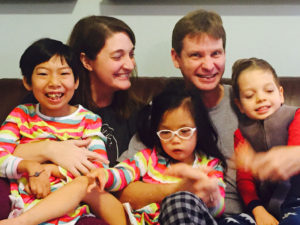
The Williamses’ first Christmas as a family of five, a few days after adopting Esther from China. From left, Esther, Elaine, Lily, Doug and Benaiah.
“I felt so isolated (before we had nurses),” Elaine says. “He works a lot of nights, and is the FCA (Fellowship of Christian Athletes) sponsor (at Hinds), and I want to support that.
“(But) I found myself at home and needing him so much. You don’t want to be that needy.”
Now, she and Doug know they can have date night once a week. They like to eat at locally owned Jackson-area restaurants “and just hang out all night,” Doug says.
“We’re very protective of our marriage,” Elaine says. “At one point Benaiah was very sick, and Doug was living at the hospital with him, and I was home with Lily, and we’d pass each other in the night. We prayed (for our marriage).”
Of course, they’re already beating the odds.
Doug notes that half of all marriages end in divorce, and that number increases when both spouses come from broken homes, as he and Elaine do. Add to that multiple special needs children…
“We have a negative-percent chance of our marriage surviving,” Elaine says, laughing.
THE VAN
Wheelchair-accessible vans are expensive. The conversion alone costs around $30,000 and you have to buy a newer van to begin with.
“So Doug said, ‘Let’s start trying to save.’ We had like $100 a month we could save,” Elaine says, laughing.
Then they got a call from their church, Pinelake Clinton. A wheelchair-bound woman had died, and her family wanted to donate her van. They’d asked the church if there was anyone who needed it.
“They didn’t know we had researched There are only two types of minivans that can accommodate two wheelchairs, particularly Esther’s power chair, which is bigger. And it was the right kind of van,” Elaine says.
“That vehicle is like a bear hug from God for me: ‘I told you I would take care of you.’”
PARIS
Doug and Elaine always loved traveling together, and before having children, they set a goal to go to Paris for their 10-year anniversary in 2018.

Thanks to Elaine’s mother and a talented team of nurses, she and Doug were able to fulfill their dream of celebrating their 10-year anniversary in Paris.
“Then (after having Benaiah and adopting the girls) we just thought, no way,” Elaine says.
But then they got the nurses. And a few months later, Elaine felt she could leave the kids with the nurses for a week and not worry too much.
So for a week in December, Doug and Elaine explored Paris. Meanwhile, another surprise was developing at home.
Unbeknownst to them, one of their nurses, Elise Ades, had decided she wanted to gift them a kitchen table. She made a video about the family and asked for donations from her church.
The money covered the cost of the table. And then the donations kept pouring in.
“The more money that came in, she’d see if she could (redecorate) one more room,” Elaine says.
Finally, after putting new furniture in the kitchen, living room, master bedroom and Benaiah’s room, Elise knew she couldn’t leave out the girls. So she redid their rooms too — all the while sending their parents “normal” photos of the kids, shot in strategic locations that wouldn’t reveal what was happening.
When Doug and Elaine got back, they entered the house blindfolded. The photo of Elaine’s face when she first sees the kitchen says it all.
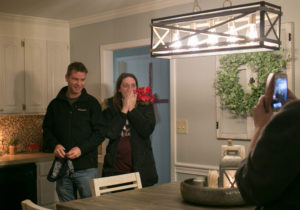
They were absolutely shocked at their home makeover. Elaine says she usually picks up on people trying to keep a surprise from her, but she had no idea.
HEALED IN HEAVEN
Everyday life at the Williams house is still a challenge. And they know their hard times aren’t over.
“We believe we’re probably going to bury all three of our kids one day. And that is OK. We’ll see them in heaven one day, and everyone will be healed,” Doug says.
And when that happens?
“We’ll experience more healing in heaven than they will,” Elaine says. “Their hearts are so pure.


